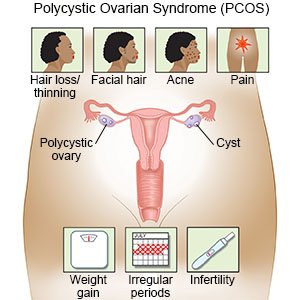Polycystic Ovarian Syndrome
Medically reviewed by Drugs.com. Last updated on Aug 4, 2025.
AMBULATORY CARE:
What do I need to know about polycystic ovarian syndrome (PCOS)?
- PCOS is a group of symptoms caused by an imbalance in the male (androgens) and female (estrogens) hormones. This imbalance can stop your ovaries from working like they should. Usually, one follicle or cyst grows on the ovary each month. This follicle contains the egg. After the egg is released, the follicle goes away.
- In PCOS, many follicles form and the eggs are not released. The ovaries look like they have many cysts on them. These follicles make higher levels of the male androgen hormone and insulin that cause the symptoms of PCOS. PCOS can make it hard to get pregnant and raises your risk for endometrial cancer. It can also cause acne, weight gain, and extra hair on your face or body.
 |
Common signs and symptoms:
You may have one or more of these signs and symptoms:
- Irregular or absent monthly periods
- Too much hair on your face, chest, or back (hirsutism)
- Trouble getting pregnant
- Acne, thinning hair or bald spots on your scalp
- Weight gain, especially around your abdomen
- High blood sugar levels or high blood pressure
- Mood swings, anxiety, or feeling very sad
- Dark skin patches on your neck, groin, or under your breasts
- Skin tags in your armpits or on your neck
- Trouble sleeping or feeling very tired
Seek care immediately if:
- You have sudden, severe abdominal pain.
- You have heavy vaginal bleeding that is unusual for you.
Related medications
Call your doctor or gynecologist if:
- Your symptoms get worse.
- You think you might be pregnant.
- Your depression keeps you from doing your regular daily activities.
- You have questions or concerns about your condition or care.
Medicines for PCOS
may be given to help treat the pre-diabetes effects of PCOS. Hormone medicines, like birth control pills, can balance your menstrual cycle. Certain medicines, like spironolactone, can help lower male hormones. These can also improve acne and decrease extra hair growth. If you want to get pregnant, other medicines can help you ovulate. You may also need medicine to decrease depression or anxiety related to your PCOS.
Manage your symptoms:
- Manage other health conditions. PCOS increases your risk for diabetes, heart disease, and high blood pressure. Your healthcare provider may send you to specialists that teach you how to manage these conditions.
- Talk to someone about how you are feeling. This might be a family member, friend, or a mental health professional like a counselor or psychiatrist. Talking things through can help you cope with the ups and downs of PCOS.
- Get regular physical activity. Physical activity can help keep your blood sugar level steady. It can also lower your risk for heart disease and help you manage your weight. Get at least 150 minutes of moderate to vigorous aerobic physical activity each week. Resistance training, such as lifting weights, should be done 3 times each week. Do not miss more than 2 days of physical activity in a row. Do not sit longer than 30 minutes at a time. Your healthcare provider can help you create an activity plan. The plan can include the best activities for you and can help you build your strength and endurance.


- Make healthy food choices. Healthy foods include fruits, vegetables, whole-grain breads, low-fat dairy products, beans, lean meats, and fish. A dietitian may help you plan meals to help manage your other health conditions.

- Maintain a healthy weight. Ask your healthcare provider what a healthy weight is for you. A healthy weight can help reduce the symptoms of PCOS. Ask your provider to help you create a weight loss plan, if needed. Even a 5% decrease can make a difference. Together you and your provider can set manageable weight loss goals.
Follow up with your doctor or gynecologist as directed:
You may need to return for more tests or to check if the treatment is working. Write down your questions so you remember to ask them during your visits.
© Copyright Merative 2025 Information is for End User's use only and may not be sold, redistributed or otherwise used for commercial purposes.
The above information is an educational aid only. It is not intended as medical advice for individual conditions or treatments. Talk to your doctor, nurse or pharmacist before following any medical regimen to see if it is safe and effective for you.
Further information
Always consult your healthcare provider to ensure the information displayed on this page applies to your personal circumstances.
